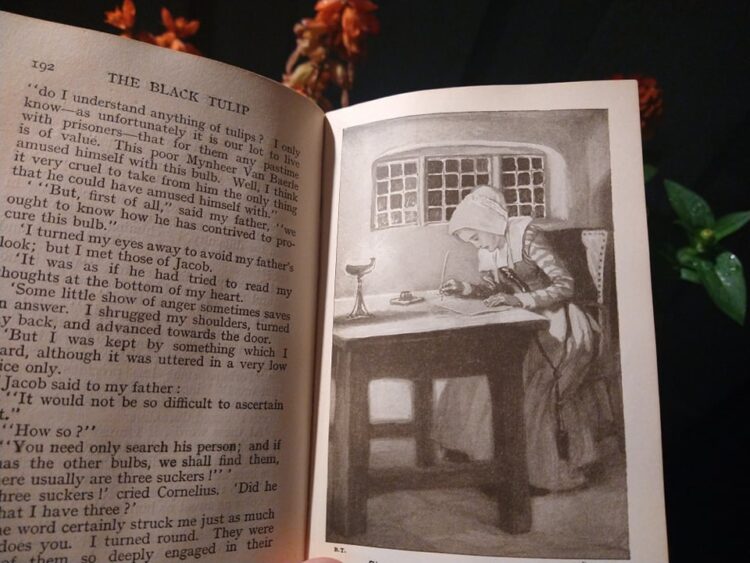
Alexandre Dumas – The Black Tulip
When fumbling through the ancient first english editions of many Balzac offerings in my haul recently, I came across this quaint little obscure Dumas novel and wondered when I had bought it, and also why I had not ever heard of it before. Must have been swept up in that hysteria which consumed me after delving deeper into Balzac (which began with Harlot High and Low) and then finding, after living through 25 of his tomes, a grand selection of the same, fancy bound seemingly made of papyrus in a delightful, tatty bookstore which homed cats on the shelves. Maybe a purr and stroke and wagging bothered tail led me to Black Tulip and at the time I thought why not eh!
Quickly on the first english editions…Something seemed precious of them, but I didnt think of the time, of the art of translation, nor of the eagerness to make money for the publishers thinking ‘this best seller in France! Lets just get it out as quickly as possible in English, for we must be first first first!!!! never mind the edits and proof reading!’.
Indeed. For all of the ancient pages of the 1780s printed first english editions of Balzac contained appalling translations, littered with spelling mistakes and clunky english. Not that I could do better. My french is passable but generally a butchery! Yet it taught me that translation is an art onto itself. Generally improves with each iteration and over time. Between languages, cultures, ages, sentences cannot be simply translated verbatim, for sometimes, the word in one language doesn’t exist in another! Add to this the nuances of tone and inflexion, and the process becomes closer to that of a writer, an artist, who has to fully understand the original and employ their own love of the written word to create as close to what the original author intended as possible. Ideally it requires also a devotion to the text, to commit to essentially adding the flesh to the bare bones of loose narrative and intention of dialogue that can be moved from one culture to another.
And so…I was hesitant of opening Back Tulip. Spurred on by my incredible appreciation of Count of Monte Cristo, yet never taken enough with the Muskateers for it to take hold…I first peeked at the life of Dumas, and especially that of his father. Tremendous stories of their own intrigue! Then began to turn the weathered by the passage of 120 years pages…
Black Tulip sets the scene with some historical accuracy, which is frightfully brutal though appears fairly accurate…within this savage time, he creates a story of cunning, greed, jealousy, further advent and record of seismic social and cultural upheaval…and most importantly of all, for me personally…a romance so deep, pure and magical, that even after all these years have passed, can still make my old heart sing and swoon with such love for the star struck hero and heroine, that I felt every moment as a doting brother to them both, wanting desperately for them to find just a sliver of hope for such a rare and gorgeous mutual happiness of two finding two becoming one of heart and soul…
That is the reason for writing this review. The world needs more of that kind of romance and adventure, and hope against all odds. For we have become prone to convenience, ticking boxes, not following what makes the heart sing, through hell and high water to be close to and devote ourselves towards. Instead some tame, lame, lukewarm pale echo of the love all our hearts crave and deserve.
A slight spoil of the narrative, which still now to recall warms and offers me some solidarity with the lunatic romantic seeking the richest wine of life that can be supped…from centuries ago.
The sensitive, honourable man cruelly, unjustly jailed. Condemned to EXECUTION. His gruesome jailer falls and breaks his arm, is unconscious, chance to escape, save his life. The jailer’s daughter, implores him to do so, yet he smiles, and thinks…
‘I would rather cherish the hour for one more evening before my demise, when I can see her face, hear her voice, feel her purity in any way near me, through the grating of the prison door…than escape and never know such love again’.
Indeed, I hope more can read and feel and be inspired to seek nothing less than such beautiful, all consuming devotion, in a world still just as brutal, just as muddled, as it was 200, 500, 800 years ago…We haven’t changed that much, beyond losing our belief in true romance and magic.
Recent Comments